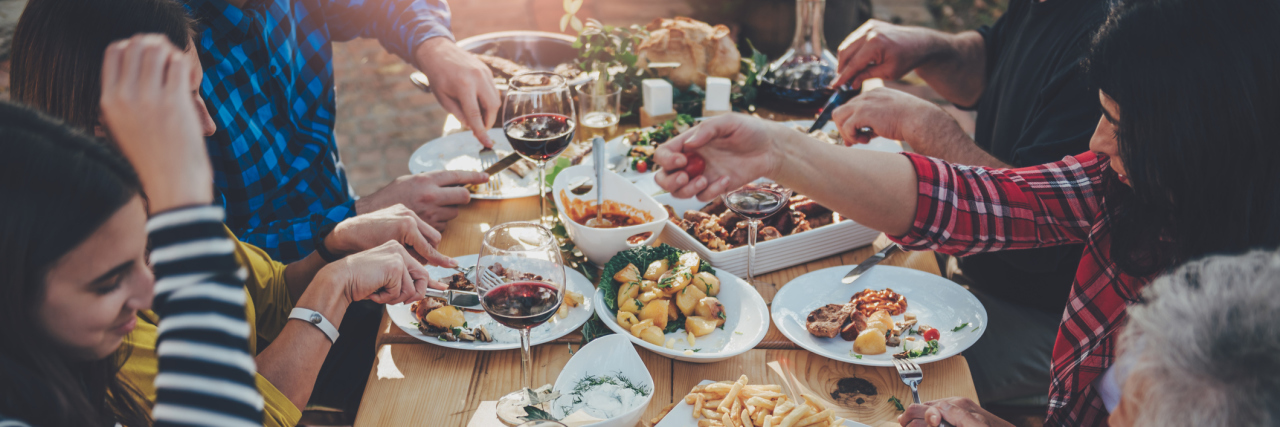Yes, I Can Eat That: How to Deal With the Diabetes 'Food Police'
If you live with diabetes you’ve probably found yourself about to eat something delicious when you suddenly notice someone staring at you. Maybe it’s a friend, colleague, family member — or even someone you met five seconds ago — and they’ve suddenly become a member of the “food police” when they say the question we hate the most: “Can you eat that?”
No matter how well-meaning such a comment is, it’s still frustrating and annoying. And it’s actually one of my top five things you should never say to someone living with diabetes. Because, yes, we can eat that! Unless someone laced it with poison, of course.
So, what can we do about these nosy, tedious “food police?” I think you have two options: you can let it slide, or you can see it as an opportunity to turn an annoying question into an educational moment.
I believe most often those types of questions, comments, stares aren’t meant to disrespect us. Even if it can feel that way. I truly believe that most of the time the comments are rooted in a concern for our well-being but unfortunately wrapped in ignorance and a lack of social etiquette.
How I deal with the “food police”
My personal approach to handling the “food police” will depend largely on who that person is — because there’s a big difference in my reaction to a comment from my mother versus a new friend.
And I must admit that I don’t always handle it the best way. I am guilty of sometimes seeing it as food shaming. And then I might roll my eyes or snap back when someone comments on my food choices.
The more I prepare or anticipate a question or comment, the more likely I can respond in a more appropriate and friendly manner.
I’ve come up with three different answers that each call for different levels of conversation. Depending on who you’re speaking to, you may or may not feel like going into a lot of detail on how and why you’re choosing to eat something despite having diabetes.
Let’s take a look…
Answer 1: Yes! I can eat that.
This is the “I don’t have time for a long explanation” answer. It’s the answer I use when I don’t feel like talking about diabetes or when I want to shut down a conversation with someone who should know better (…Aunt Becky, we’ve discussed this a thousand times before). Or if it’s someone I barely know, who isn’t actually concerned about my health and just likes being a know-it-all.
I think it’s a missed opportunity to stop there, but sometimes it’s just too exhausting to give any further explanation. A short follow-up might just be, “Actually, there’s nothing I can’t eat with diabetes.”
Answer 2: That’s a common misconception.
This is probably the answer I use most often. It’s the “Let me teach you about diabetes answer,” and it will immediately be followed by a short lecture on why people living with diabetes can eat as they please.
Given the lecture component, it does require that I have at least five minutes to explain more about diabetes, and the different ways people living with diabetes can manage their blood sugar levels.
My goal is always that people walk away from the conversation with a better understanding of what diabetes is, the different types of diabetes, and the different approaches to diabetes management. What I always hope to achieve is to kill off at least one or two misconceptions about diabetes.
Answer 3: What makes you say that?
This is the answer I would save for new friends or people I really care about. My goal here will be to have a deeper conversation about diabetes. I’ve found that most people have several deeply rooted misconceptions about diabetes and opening up with a question such as “What makes you say that?” can quickly set the conversation on the right course.
Often misconceptions are based on what people read in the media, like: eating too much sugar causes diabetes, people living with diabetes are allergic to sugar, they all need to follow a diabetic diet, you just need to take a shot or a pill, people living with diabetes lose their legs and die early, etc.
I’ve found that when people who care about you ask “Can you eat that?” it’s often because they worry that if you do eat it, one of those misconceptions will come true about you — someone they love. Having a deeper conversation can often ease their concern and prevent the person from continuing their tenure as the “food police.”
Ultimately you have to develop your own strategies for dealing with the “food police.” But I do think it’s important to speak up if you feel that people in your life are overstepping your boundaries or meddling in things they shouldn’t. At the end of the day, it is our job as people with diabetes to educate others about real life with diabetes. We can’t expect them to know about a disease they don’t live with. Just think about it: if you didn’t live with it, would you know as much as you do?
Follow this journey on Diabetes Strong.
Getty photo by Kerkez

